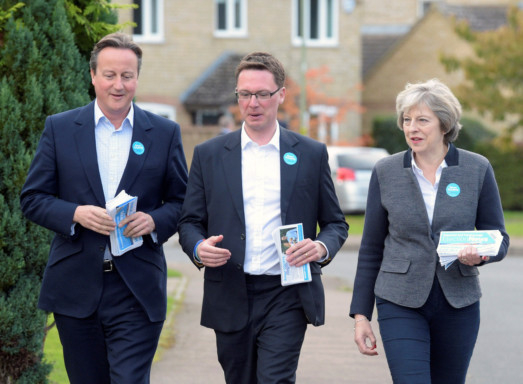
Tomorrow morning, the bookies assume, there will be a new Conservative MP for Witney, the constituency suddenly vacated by former British prime minister David Cameron when he resigned last month. While few doubt that the Tory candidate, Robert Courts, will win, it is likely he will have no more than 40 per cent of the vote, where his predecessor had won 60 per cent.
Courts faces a strong Liberal Democrat challenge and an equally strong Labour one. These two candidates will split the non-Conservative vote and allow Courts to become another name in the long succession of Tory MPs for west Oxfordshire. His victory will be taken as an endorsement of British Prime Minister Theresa May’s divisive and sometimes dangerous rhetoric about Brexit. Those who oppose both the style and substance of what she says will be weakened. This is not an attempt to rerun the referendum or overturn the popular will, it is about making sure that leaving Europe inflicts as little collateral damage as possible.
Now just imagine what a message could have been sent if Labour and the Lib Dems — and perhaps the Greens too — had run a single candidate to campaign just on a pro-single market, pro-migrant, pro-refugee ticket. These are issues that many voters in Witney, a constituency that voted to remain in the European Union (EU) by 54 per cent to 46 per cent, care about deeply. These are people who trek into Oxford to join Refugees Welcome marches and who support the local council’s Asylum Welcome work.
But instead, even though the two main challengers are actually working together on the council to set up a community transport company to replace newly axed bus services, for the past three weeks they have been fighting each other over the sterile territory of who’s to blame for the cuts. What an indictment this byelection will be of British politics’ destructive preference for the narcissism of small differences.
Over the next two years, Britain will be remade by a government with a working majority of 12. This new country that is being born will be out of Europe, its territorial integrity under threat from nationalism and its outlook narrow and sometimes xenophobic. It is a place where millions of people will find themselves ill at ease. Proof of identity will become part of everyday life, not just an inconvenience for under-25s at a party. And the first serious opportunity to challenge its direction is taken as the opportunity to debate local buses.
It is typical of the reductionist style of politics that has undermined the capacity of Westminster to represent the whole country. It may be why people who ran street stalls during the referendum campaign report that time after time they found bewilderment about what was at stake. This is the lesson: If you treat voters as if they are nothing but a compound of self-interested behaviours, then that’s what you get.
The EU referendum should have left voters in no doubt about the power of their vote. Byelections, held at critical moments such as this one, can do something more subtle but just as powerful. Cameron is far too tactical a politician not to have been aware of the hold that a few thousand voters can exert over a government, not least one embarking on the fraught and uncertain route to Brexit.
A campaign that challenged May’s determination to remake Britain by executive fiat, and demanded instead that parliament be allowed its central role in shaping the country’s future could have helped to influence wider public opinion and the political context.
In the 1930s, perhaps the last period when the national mood was so uncertain, byelections became a way of demonstrating opposition to government policy. Depression, economic collapse and the rise of fascism had split the Labour party, destroyed the Liberals and left the country in the control of a single party.
In 1933, after the Fulham East byelection was won by John Wilmot, a pacifist Labour candidate, Stanley Baldwin was persuaded not to campaign for rearmament. Five years later, after the “peace in our time” Munich agreement in 1938, a series of byelections — most famously in Oxford and Bridgwater — became in effect plebiscites on Neville Chamberlain’s policy of appeasement.
The main opposition parties were as reluctant to stand a single candidate then as now. A Labour MP who came to support the anti-appeasement candidate in Bridgwater summed up the attitude: “I have not departed one iota from my Labour principles. When the campaign is over, I shall go back again to the party to which I belong. Until then, I feel there is much work to be done in making a protest against this government.” Victory for the Liberal Vernon Bartlett did not change government policy. But it did challenge the orthodoxy.
West Oxfordshire has already had one moment in history: In 1990, at the height of the political row over the poll tax, 18 Conservative councillors in Witney resigned in protest at a tax that fell hardest on the least able to pay. Douglas Hurd, the then foreign secretary, told the then prime minister Margaret Thatcher it was serious. Their action didn’t quite defeat the policy, but it was a revolt that significantly loosened Thatcher’s grip on power.
This week, there will be no unambivalent message for May, no irrefutable clarion call to end the anti-migrant rhetoric and work for as soft a Brexit as possible. Witney 2016 could have been another byelection that changed Britain. Instead it will be business as usual.
— Guardian News & Media Ltd
Anne Perkins has been a leader writer, lobby correspondent and feature writer for the Guardian since 1997.












